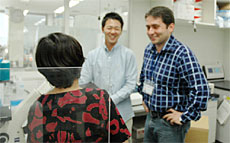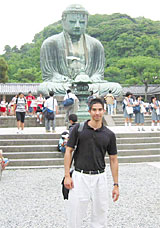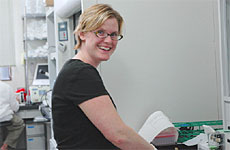| RIKEN Center
for Developmental Biology (CDB) 2-2-3 Minatojima minamimachi, Chuo-ku, Kobe 650-0047, Japan |
| A summer of study and fun for young foreign scientists at the CDB |
October 7, 2004 – The opportunity to work in world-class research facilities in an unfamiliar region of the world has proven to be a strong attractive to the young scientists who have come to the RIKEN Center for Development Biology (CDB; Kobe, Japan) as part of the summer study program sponsored by the Japan Society for the Promotion of Science (JSPS) and the Graduate University for Advanced Studies in association with science agencies in the USA, UK, France, Germany and Canada. The Program provides opportunities for young pre- and post-doctoral researchers from North America and Europe to receive an introduction to Japanese culture and research systems and to pursue their research under the guidance of host researchers at Japanese universities and research institutes. The Program is held every year, spanning eight weeks from late June through late August. Every summer program participants’ visit to Japan begins
with a one-week orientation in a seaside town in Kanagawa Prefecture,
near Tokyo, receiving basic lessons in the Japanese language and
in what to expect during their stay. While most cited this experience
as valuable, some felt the time could better be spent focusing on
more specific needs. “It should be shorter, maybe 3 days instead
of 7. We're only in Japan for 2 months - we shouldn't be in orientation
for 1/8th of our stay,” noted Neal Rao, who returned to the
CDB as a JSPS summer student in 2003 after working at the Center
as a public information and international affairs coordinator the
previous year. “Orientation is important, but vacationing
in Hayama really won't "orient" people to their actual
situation in Japan (which will probably be in a city instead of
a countryside resort town). Orientation should be carried out more
in the host institution.” JSPS and the partnering agency in their home country. In addition
to roundtrip airfare from the home country to japan, the JSPS provides
allowances for everyday needs and research travel, and makes funds
for research-related available to the hosting lab. JSPS fellows
are expected to make and pay for their own housing arrangements
for their stay, which can be difficult in an urban location such
as Kobe, where short-term accommodations can be hard-to-find and
high-priced. Several fellows mentioned that this was one of the
least positive aspects of their experience in Kobe, highlighting
the immediate need for facilities for guest researchers in the Port
Island research park. All were positive, however, about the research environment within
the Center. “It’s the best site in the world for the
kind of research that I enjoy working in, stem cell biology,”
claims Rao. “In my current lab, much of the equipment is old
or has been moved to a new campus. The CDB has the best equipment
I have ever seen.” All four JSPS fellows answered yes when
asked if they would consider returning to Japan to do full-time
research, noting the excellence of the facilities and high level
of support given to CDB labs as an important factor. More than one visitor has already made good on that promise. Dr
Alev returned to the Laboratory for Stem Cell Translational Research
(Team Leader, Takayuki Asahara) this summer to begin a one-year
postdoctoral fellowship. The head of another CDB lab, Raj Ladher
(Laboratory for Sensory Organogenesis) also first came to Japan
as a JSPS fellow at Tokyo Medical and Dental University in 1998.
“It really seems to have grown since I participated,”
he says, “there may be twice as many people in the program
now compared to when I came.” Designed to provide scientists from outside the country with a
glimpse into life in a Japanese research environment, the Summer
Program has proven to be an eye-opening cross-cultural experience
for all. Fellows at the CDB noted a range of differences, mainly
involving differences in communications styles and working hours.
“The days for a normal researcher are very, very, very long
in Japan. Despite the gruelling hours logged in some labs, summer in Japan
is not all work and no play. Kobe offers a great blend of entertainment,
learning and travel opportunities for the young student or postdoc.
Visitors to the Center have taken advantage of their time here to
visit other parts of Japan, from Hokkaido to Kyushu, with some staying
after the conclusion of the program to do additional sightseeing.
Details about the JSPS Summer Program can be found at http://www.jsps.go.jp/english/e-summer/index.html
or at the offices of participating research agencies. |
[ Contact ] Douglas Sipp : sipp@cdb.riken.jp TEL : +81-78-306-3043 RIKEN CDB, Office for Science Communications and International Affairs |
| Copyright (C) CENTER FOR DEVELOPMENTAL BIOLOGY All rights reserved. |
 Situated
conveniently close to the center of Kobe, a picturesque and dynamic
port city near Osaka on Japan’s Inland Sea, the CDB has hosted
four JSPS summer scholars in the past two years, an unusually high
turnout for a new research institute. Applicants choose from 115
publicly funded research institutes, national labs and NPOs when
making their requests to be hosted. While some Summer Program fellows
came to the Center via personal connections or a prior relationship
with a specific lab, others noted the strength of its reputation
as the deciding factor. Cantas Alev, who came to the CDB from the
lab where he was working on his doctorate in Germany in 2003 says,
“I felt that the newly founded RIKEN CDB was one of the few
spots in the world with such a high density of very successful young
scientists and researchers in the field of developmental biology,
offering rich technical and personal resources and opportunities
in an exciting research environment.”
Situated
conveniently close to the center of Kobe, a picturesque and dynamic
port city near Osaka on Japan’s Inland Sea, the CDB has hosted
four JSPS summer scholars in the past two years, an unusually high
turnout for a new research institute. Applicants choose from 115
publicly funded research institutes, national labs and NPOs when
making their requests to be hosted. While some Summer Program fellows
came to the Center via personal connections or a prior relationship
with a specific lab, others noted the strength of its reputation
as the deciding factor. Cantas Alev, who came to the CDB from the
lab where he was working on his doctorate in Germany in 2003 says,
“I felt that the newly founded RIKEN CDB was one of the few
spots in the world with such a high density of very successful young
scientists and researchers in the field of developmental biology,
offering rich technical and personal resources and opportunities
in an exciting research environment.” 
 In Germany Ph D students also stay in the lab very late and work
weekends, but I was still surprised at how long a working day can
be in Japan.” says Alev, “But thanks to the fact that
almost everybody is staying till very late, one is also never alone,
which is quite nice.” Some fellows at other institutes have
experienced a greater sense of isolation while in Japan, however.
“I know one person who was forced to speak to the head of
their lab through a grad student acting as interpreter,” recalls
Carole Burns, who worked in the Ladher lab in the summer of 2004,
“Fortunately, we don’t have that kind of problem here.”
In Germany Ph D students also stay in the lab very late and work
weekends, but I was still surprised at how long a working day can
be in Japan.” says Alev, “But thanks to the fact that
almost everybody is staying till very late, one is also never alone,
which is quite nice.” Some fellows at other institutes have
experienced a greater sense of isolation while in Japan, however.
“I know one person who was forced to speak to the head of
their lab through a grad student acting as interpreter,” recalls
Carole Burns, who worked in the Ladher lab in the summer of 2004,
“Fortunately, we don’t have that kind of problem here.”